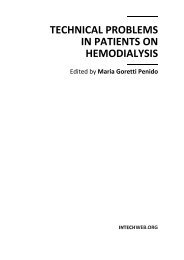new insights into the prevention and treatment of bulimia nervosa
new insights into the prevention and treatment of bulimia nervosa
new insights into the prevention and treatment of bulimia nervosa
You also want an ePaper? Increase the reach of your titles
YUMPU automatically turns print PDFs into web optimized ePapers that Google loves.
Bulimia Nervosa <strong>and</strong> Personality: A Review<br />
The type <strong>of</strong> personality disorder most frequently observed in patients diagnosed with<br />
<strong>bulimia</strong> <strong>nervosa</strong> is <strong>the</strong> borderline personality disorder.<br />
Impulsivity is <strong>the</strong> most consistent distinguishing finding described in <strong>bulimia</strong> <strong>nervosa</strong>.<br />
Patients with <strong>bulimia</strong> <strong>nervosa</strong> <strong>and</strong> personality disorders <strong>of</strong>ten have an additional Axis I<br />
disorder, <strong>the</strong> most common being major depression <strong>and</strong>/or substance<br />
abuse/dependence.<br />
9. A model <strong>of</strong> a <strong>new</strong> approach: Eating disorders <strong>and</strong> coping strategies<br />
In initial studies it was considered that <strong>the</strong> role played by coping strategies in eating<br />
behaviours was not clear (Wolff, Crosby, et al., 2000). Later on, it has been indicated that<br />
difficulties on emotion control explain better <strong>the</strong> occurrence <strong>of</strong> binge eating than eating<br />
restriction or weight <strong>and</strong> corporal image overestimation do (Whiteside, Chen, et al., 2007),<br />
so that in a binge disorder explanatory model emotional vulnerability <strong>and</strong> deficient<br />
strategies for <strong>the</strong> regulation <strong>of</strong> emotions would be included. Patients with eating disorders<br />
are more inclined to avoid affection than to <strong>the</strong> acceptance <strong>and</strong> control <strong>of</strong> emotions<br />
(Corstorphine, Mountford, et al., 2007).<br />
Coping strategies have been related to <strong>the</strong> prognostic <strong>of</strong> eating disorders <strong>and</strong> it has been<br />
observed that impulsiveness, present in some <strong>of</strong> its forms, is connected to maladaptive<br />
strategies <strong>of</strong> emotional regulation (Nagata, Matsuyama, et al., 2000).<br />
The specificity <strong>of</strong> deficient coping strategies found in patients with eating disorders has also<br />
been discussed. With respect to <strong>bulimia</strong> <strong>nervosa</strong>, it has been observed that <strong>the</strong> tendency to<br />
avoidance, understood as a coping strategy, could be more related to a depressive than to a<br />
bulimic symptomatology. However, o<strong>the</strong>r strategies such as problem solving or cognitive<br />
restructuring do not seem to differ depending on depressive symptoms (Tobin & Griffing,<br />
1995).<br />
The problem to be confronted when it´s time to assess how different coping strategies with a<br />
determined symptomatology or personality styles relate to each o<strong>the</strong>r lies in <strong>the</strong> fact that<br />
interrelations among different strategies are very frequent. (Folkman & Moskovitz, 2004).<br />
The studies which have related coping strategies <strong>and</strong> personality usually conclude that<br />
emotionally stable, extrovert <strong>and</strong> responsible people tend to solve situations or change <strong>the</strong><br />
meaning <strong>of</strong> <strong>the</strong>se situations perceiving <strong>the</strong>ir coping as efficient, while unstable <strong>and</strong> introvert<br />
people are used to withdraw from society <strong>and</strong> usually wish <strong>the</strong> situation had not occurred,<br />
perceiving little efficiency in <strong>the</strong>ir coping (Bouchard, 2003; Cano, Rodríguez, et al., 2007;<br />
David & Suls, 1999).<br />
Knowledge about coping strategies in patients with eating disorders is relevant <strong>and</strong> this<br />
relevance does not only lie in a <strong>the</strong>oretical interest or in its relationship with comorbidity or<br />
personality characteristics but also in a <strong>the</strong>rapeutic interest. Hence, learning <strong>of</strong> <strong>new</strong> <strong>and</strong><br />
more adaptive forms <strong>of</strong> coping with problems <strong>and</strong> emotions is essential in some <strong>treatment</strong><br />
forms for <strong>the</strong>se pathologies (Foa & Wilson, 1991; Peterson, Wonderlich, et al., 2004).<br />
In a recent study (Jáuregui Lobera, Estébanez, et al., 2009), it was observed that patients with<br />
eating disorders showed more self-criticism, social withdrawal, inadequate control centred<br />
upon emotions <strong>and</strong> inadequate control in general. On <strong>the</strong> contrary, a group <strong>of</strong> students<br />
showed bigger scores at problem solving, social support, cognitive restructuring, adequate<br />
control centred upon problems, <strong>and</strong> adequate control in general. Perceived self-efficacy was<br />
greater in <strong>the</strong> student group too. Regarding personality features in <strong>the</strong> group <strong>of</strong> patients,<br />
punctuation in introversion was significantly greater, while in <strong>the</strong> group <strong>of</strong> students<br />
139




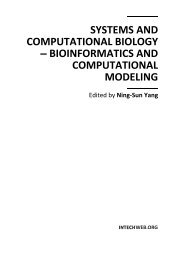



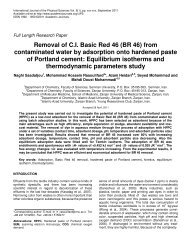

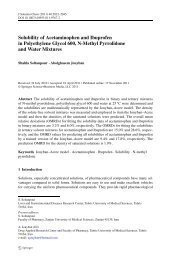
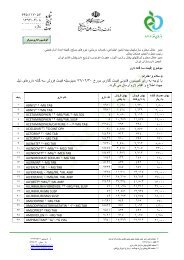

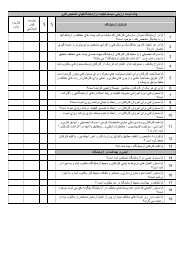
![focuspdca.ppt [Compatibility Mode]](https://img.yumpu.com/22859457/1/190x146/focuspdcappt-compatibility-mode.jpg?quality=85)

